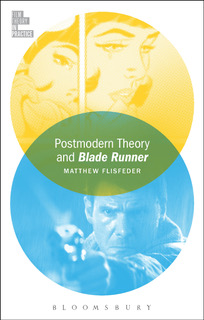
Matthew Flisfeder, ©UWinnipeg.
Dr. Matthew Flisfeder’s new book introduces readers to postmodern theory and demonstrates how it can be used for a critical analysis of “the greatest science fiction film.”
Set to be released in October, Postmodern Theory and Blade Runner (Bloomsbury Publishing 2017) argues that the themes presented in the 1982 cult film directed by Ridley Scott and featuring Harrison Ford, continue to be relevant today.
“Blade Runner is a film that continues to impress upon our historical present. It is stylistically and thematically relevant to our postmodern present, and resonates with our experiences of post-crisis neoliberal capitalism,” said Flisfeder. “Its troubling of human subjectivity and agency provides a cognitive mapping of sorts for our own understandings of race, class, and gender, and puts these in the context of the digital world in which we now live.”
 An assistant professor in the Department of Rhetoric, Writing, and Communications, Flisfeder adds that the film’s reinvention in various forms — the Director’s Cut, the Final Cut, and the new sequel, Blade Runner 2049 — demonstrate that Blade Runner is perpetually present.
An assistant professor in the Department of Rhetoric, Writing, and Communications, Flisfeder adds that the film’s reinvention in various forms — the Director’s Cut, the Final Cut, and the new sequel, Blade Runner 2049 — demonstrate that Blade Runner is perpetually present.
By contextualizing the film within the culture of late 20th and early 21st-century capitalism, Flisfeder provides a valuable, jargon-free guide for both students and scholars interested in learning more about postmodernism — one of the most significant, influential, and controversial concepts in film and cultural studies.
Postmodern Theory and Blade Runner is part of Bloomsbury’s Film Theory in Practice series, which aims to fill gaps in the world of film theory by marrying the explanation of theories with interpretations of films.
This is Flisfeder’s third book. He is the author of The Symbolic, The Sublime, and Slavoj Žižek’s Theory of Film and co-editor of Žižek and Media Studies: A Reader.
Endorsements
“This book not only offers a thorough and lucid presentation of the multiple features of postmodernist theory today, it dramatizes them in a bravura reading of Blade Runner which sees the film’s seven different versions as so many historically distinct texts, each one constituting a modified reaction to a new and evolving socio-historical situation. Flisfeder expertly treads that narrowest of paths between description and evaluation, between theory and ideology.” – Fredric Jameson, Knut Schmidt Nielsen Professor of Comparative Literature, Duke University, USA
“Between the lines of the different versions or simulacra of Blade Runner, Flisfeder offers a succinct and compelling account of postmodernism and its theoretical underpinnings. This wonderful book is an object lesson in film analysis and critical thinking that finds within the text an explanation for society’s inability to conceive of alternatives to its own dystopian and mediatised present.” – Ciara aka Colin Cremin, Senior Lecturer, The University of Auckland, New Zealand
“Matthew Flisfeder’s fast-paced and very readable book offers a knowledgeable and accessible introduction to postmodern theory. His analysis of Blade Runner not only helps unpack and illustrate his key concepts, but also gives fresh new perspectives on a modern film classic. Above all, this book foregrounds the continued relevance of postmodernism by emphasizing its usefulness as a critical and fundamentally political concept.” – Dan Hassler-Forest, Assistant Professor of Media Studies, Utrecht University, The Netherlands
All are invited to attend the launch of Postmodern Theory and Blade Runner:
When: Thursday, October 5, 2017; 7:00 pm
Where: McNally Robinson, 1120 Grant Avenue




